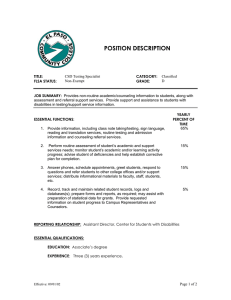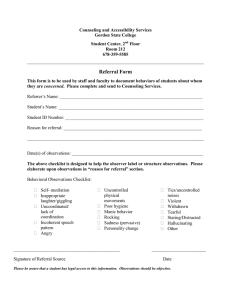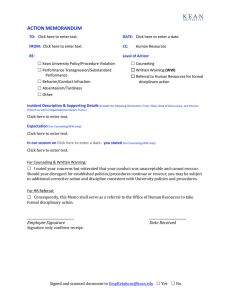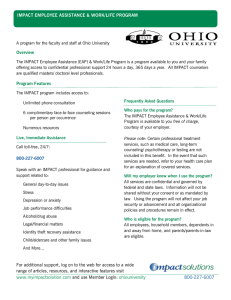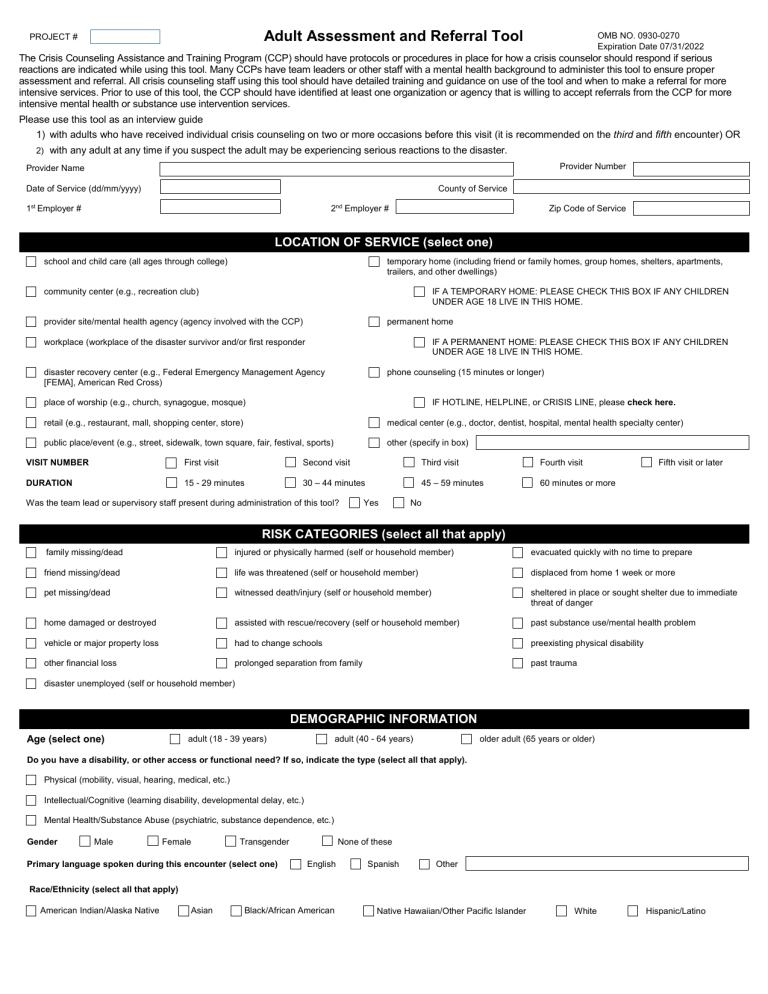
Adult Assessment and Referral Tool PROJECT # OMB NO. 0930-0270 Expiration Date 07/31/2022 The Crisis Counseling Assistance and Training Program (CCP) should have protocols or procedures in place for how a crisis counselor should respond if serious reactions are indicated while using this tool. Many CCPs have team leaders or other staff with a mental health background to administer this tool to ensure proper assessment and referral. All crisis counseling staff using this tool should have detailed training and guidance on use of the tool and when to make a referral for more intensive services. Prior to use of this tool, the CCP should have identified at least one organization or agency that is willing to accept referrals from the CCP for more intensive mental health or substance use intervention services. Please use this tool as an interview guide 1) with adults who have received individual crisis counseling on two or more occasions before this visit (it is recommended on the third and fifth encounter) OR 2) with any adult at any time if you suspect the adult may be experiencing serious reactions to the disaster. • Provider Name • Provider Number • Date of Service (dd/mm/yyyy) • County of Service st nd • 1 Employer # • 2 Employer # • Zip Code of Service LOCATION OF SERVICE (select one) • • school and child care (all ages through college) • community center (e.g., recreation club) • provider site/mental health agency (agency involved with the CCP) • workplace (workplace of the disaster survivor and/or first responder • disaster recovery center (e.g., Federal Emergency Management Agency [FEMA], American Red Cross) • place of worship (e.g., church, synagogue, mosque) • retail (e.g., restaurant, mall, shopping center, store) • medical center (e.g., doctor, dentist, hospital, mental health specialty center) • public place/event (e.g., street, sidewalk, town square, fair, festival, sports) • other (specify in box) temporary home (including friend or family homes, group homes, shelters, apartments, trailers, and other dwellings) ◦ • IF A TEMPORARY HOME: PLEASE CHECK THIS BOX IF ANY CHILDREN UNDER AGE 18 LIVE IN THIS HOME. permanent home ◦ • IF A PERMANENT HOME: PLEASE CHECK THIS BOX IF ANY CHILDREN UNDER AGE 18 LIVE IN THIS HOME. phone counseling (15 minutes or longer) ◦ IF HOTLINE, HELPLINE, or CRISIS LINE, please check here. VISIT NUMBER • First visit • Second visit • Third visit • Fourth visit DURATION • 15 - 29 minutes • 30 – 44 minutes • 45 – 59 minutes • 60 minutes or more Was the team lead or supervisory staff present during administration of this tool? • Yes • • Fifth visit or later No RISK CATEGORIES (select all that apply) • family missing/dead • injured or physically harmed (self or household member) • evacuated quickly with no time to prepare • friend missing/dead • life was threatened (self or household member) • displaced from home 1 week or more • pet missing/dead • witnessed death/injury (self or household member) • sheltered in place or sought shelter due to immediate threat of danger • home damaged or destroyed • assisted with rescue/recovery (self or household member) • past substance use/mental health problem • vehicle or major property loss • had to change schools • preexisting physical disability • other financial loss • prolonged separation from family • past trauma • disaster unemployed (self or household member) DEMOGRAPHIC INFORMATION Age (select one) • • adult (18 - 39 years) • adult (40 - 64 years) older adult (65 years or older) Do you have a disability, or other access or functional need? If so, indicate the type (select all that apply). • Physical (mobility, visual, hearing, medical, etc.) • Intellectual/Cognitive (learning disability, developmental delay, etc.) • Mental Health/Substance Abuse (psychiatric, substance dependence, etc.) Gender • Male • Female • Transgender Primary language spoken during this encounter (select one) • None of these • English • Spanish • Other Race/Ethnicity (select all that apply) • American Indian/Alaska Native • Asian • Black/African American • Native Hawaiian/Other Pacific Islander • White • Hispanic/Latino ASSESSMENT QUESTIONS GIVE RESPONSE CARD TO RECIPIENT. READ: These questions are about the reactions you have experienced IN THE PAST MONTH. By reactions, I mean feelings or emotions or thoughts about the events. For each question choose one of the following responses from this card. • 1 = not at all •2 • = a little bit • 3 = somewhat • 4 = quite a bit QUESTIONS TO BE READ 5 = very much RESPONDENT’S ANSWERS 1. How much have you been bothered by unwanted memories, nightmares, or reminders of what happened? 1 2 3 4 5 2. How much effort have you made to avoid thinking or talking about what happened or doing things that remind you of what happened? 1 2 3 4 5 0 1 To what extent have you lost enjoyment in things, kept your distance from people, or found it difficult to experience feelings because of what happened? 1 2 3 4 5 0 1 How much have you been bothered by poor sleep, poor concentration, jumpiness, irritability, or feeling watchful around you because of what happened? 1 2 3 4 5 0 1 3 4 5 3 4 5 3 4 5 3 4 5 3 4 5 3 4 5 3 4 5 3. 4. 5. 6. 7. 8. 9. 10. 11. How down or depressed have you been because of what happened? Has your ability to handle other stressful events or situations been harmed? 1 2 0 1 1 2 0 1 Have your reactions interfered with how well you take care of your physical health? For example, are you eating poorly, not getting enough rest, smoking more, or finding that you have increased your use of alcohol or other substances? 1 2 0 1 How distressed or bothered are you about your reactions? 1 2 0 1 How much have your reactions interfered with your ability to work or carry out your daily activities, such as housework or homework? 1 2 0 1 How much have your reactions affected your relationships with your family or friends or interfered with your social, recreational, or community activities? 1 2 0 1 How concerned have you been about your ability to overcome problems you may face without further assistance? 1 2 0 1 NUMBER OF RESPONSES OF 4 OR 5 (this is recipient's score) 12. In the past month, have you had thoughts about suicide? • no • yes 13. Have you ever made a suicide attempt? • no • yes 14. If yes to #12 or #13, Are you having thoughts of suicide right now? • no • yes REFERRAL INSTRUCTIONS IF THE ANSWER TO ITEM #14 IS “YES,” REFER FOR IMMEDIATE PSYCHIATRIC INTERVENTION. The CCP should have protocols or procedures in place for how a crisis counselor should respond or react if the response is “YES.” IF THE ANSWER TO ITEM #14 IS “NO,” CONTINUE: IF SCORE IS 3 OR HIGHER, OR IF THE ANSWER TO ITEMS #12 OR #13 IS “YES,” READ: FROM WHAT YOU HAVE TOLD ME, IT SEEMS THAT YOU MIGHT BENEFIT FROM PARTICIPATING IN ANOTHER SERVICE [DESCRIBE]. I WOULD LIKE TO REFER YOU TO: . IF SCORE IS BELOW 3, READ: FROM WHAT YOU HAVE TOLD ME, IT SEEMS THAT YOU ARE MANAGING YOUR REACTIONS. DOES THAT SEEM RIGHT TO YOU? IF NO, READ: PERHAPS YOU WOULD BENEFIT FROM PARTICIPATING IN ANOTHER SERVICE [DESCRIBE]. I WOULD LIKE TO REFER YOU TO: . IF YES, READ: WE SHOULD DECIDE UPON SPECIFIC GOALS FOR COUNSELING THAT WE CAN MEET TODAY OR WITHIN ANOTHER COUPLE OF VISITS. REFERRAL (select all that apply) • other crisis counseling program services (e.g., group counseling, referral to a team leader, followup visit) • community services (e.g., FEMA, loans, housing, employment, social services) • mental health services (e.g., professional, longer-term counseling, treatment, behavioral, or psychiatric services) • resources for those with disabilities, or other access or functional needs • substance abuse services (e.g., professional, behavioral, or medical treatment or selfhelp groups, such as Alcoholics Anonymous or Narcotics Anonymous) • other (specify in box) ◦ Note the type of service for which you made the referral, not the site to which you made the referral. Did the participant accept one or more of the referral(s)? • no • yes See “Referral Instructions” above. INSTRUCTIONS: ADULT ASSESSMENT AND REFERRAL TOOL When to Use This Form: It is recommended that this form be used with all adults who are intensive users of services. Intensive users are people who are participating in their third individual crisis counseling visit with any crisis counselor from the program or who continue to suffer severe distress that may be impacting their ability to perform routine daily activities. This form should be used as an interview guide (1) with adults receiving individual crisis counseling on the third and fifth occasions OR (2) with any adult at any time if you suspect the adult may be experiencing serious reactions to the disaster. Do not use this form with children; use the Child/Youth Assessment and Referral Tool. PROJECT #--FEMA disaster declaration number, e.g., DR-XXXX-State. PROVIDER NAME--The name of the program/agency. PROVIDER #--The unique number under which your program/agency is providing services. 1st EMPLOYEE #--YOUR employee number. 2nd EMPLOYEE #--Employee number of your teammate during this encounter. DATE OF SERVICE--The date of the encounter in the format mm/dd/yyyy, e.g., 01/01/2012. COUNTY OF SERVICE--The county where the service occurred. ZIP CODE OF SERVICE--The ZIP code where the service occurred. LOCATION OF SERVICE--Where did the encounter occur? SELECT ONLY ONE. VISIT NUMBER--Is this the first, second, third, fourth, or fifth or later visit for this person to your program? All visits did not have to be with you. SELECT ONLY ONE. DURATION--How long did your encounter last? SELECT ONLY ONE. If the encounter was under 15 minutes, record it on the Weekly Tally Sheet. RISK CATEGORIES--These are factors that an individual may have experienced or may have present in his or her life that could increase his or her need for services. MORE THAN ONE CATEGORY MAY APPLY. SELECT ALL CATEGORIES THAT APPLY. The Adult Assessment and Referral Tool is an interview guide, and you may ask the individual whether or not he or she has experienced the listed factors. (Note that this instruction is not the same as for the Individual/Family Crisis Counseling Services Encounter Log.) DEMOGRAPHIC INFORMATION--For each variable, SELECT ONLY ONE. The Adult Assessment and Referral Tool is an interview guide, and you may ask the individual these questions as needed. (Note that this instruction is not the same as for the Individual/Family Crisis Counseling Services Encounter Log.) For each question, read the options, and ask the individual to select the option or options that best describe(s) him or her. AGE--What age does the person indicate he or she is? SELECT ONLY ONE. PERSONS WITH DISABILITIES--If the participant considers him- or herself to have a disability or access or functional need, what type does he or she indicate (physical, Intellectual, or mental health/substance abuse)? SELECT ALL THAT APPLY. • Physical: Includes disorders that impair mobility, seeing, and hearing, as well as medical conditions, such as diabetes, lupus, Parkinson's, AIDS, multiple sclerosis (MS). • Intellectual/Cognitive: Includes a learning disability, birth defect, neurological disorder, developmental disability, or traumatic brain injury, e.g., Down syndrome. • Mental Health/Substance Use: Includes psychiatric disorders, such as bipolar disorder, depression, posttraumatic stress disorder (PTSD), schizophrenia, and substance dependence. GENDER--The gender the person reports to be. SELECT ONLY ONE. PRIMARY LANGUAGE SPOKEN DURING ENCOUNTER(S)--Which language did you actually and primarily use to speak with this individual during the encounter? This may be different from the preferred language. If “OTHER” (not English or Spanish), fill in the other language that the person used (this may include sign language). SELECT ONLY ONE. RACE/ETHNICITY--What race/ethnicity does the person identify as being? SELECT ALL THAT APPLY. ASSESSMENT QUESTIONS--GIVE THE RESPONSE CARD TO THE INDIVIDUAL. For each question, put a check mark in the appropriate box based on the individual's responses. At the end of the 11 questions, COUNT the number of check marks in boxes 4 and 5. This is the person's score. For example, an individual who answered “quite a bit” on Questions 6 and 7 and “very much” on Question 11 and “somewhat” on Questions 1-5 and 8-10 would receive a score of 3. REFERRALS--In the REFERRAL box, select all of the types of services to which you referred the person. If the service is not listed, please provide the type of service next to "other.” Please submit the completed form to the designated person in your agency who will review the form. Thank you for taking the time to complete this form accurately and fully! Paperwork Reduction Act Statement This information is being collected to assist the Substance Abuse and Mental Health Services Administration (SAMHSA) with program monitoring of FEMA’s Crisis Counseling Assistance and Training Program. Crisis counselors are required to complete this form following the delivery of crisis counseling services to disaster survivors (44 CFR 206.171 [F][3]). Information collected through this form will be used at an aggregate level to determine the reach, consistency, and quality of the Crisis Counseling Assistance and Training Program. Under the Privacy Act of 1974, any personally identifying information obtained will be kept private to the extent of the law. An agency may not conduct or sponsor, and a person is not required to respond to, a collection of information unless it displays a currently valid OMB control number. The OMB control number for this project is 0930-0270. Public reporting burden for this collection of information is estimated to average 15 minutes per assessment, including the time for reviewing instructions, searching existing data sources, gathering and maintaining the data needed, and completing and reviewing the collection of information. Send comments regarding this burden estimate or any other aspect of this collection of information, including suggestions for reducing this burden, to SAMHSA Reports Clearance Officer, 5600 Fishers Ln, Room 15E57B, Rockville, MD 20857.
